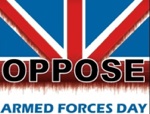
Relatives of people killed by the British Army in the north of Ireland have protested over official plans for Belfast city council to celebrate ‘British Armed Forces Day’.
On Saturday a Union Jack will be raised at Belfast City Hall as part of a series of hardline unionist “commemorations” designed to infuriate nationalists.
The republican group eirigi has said it will protest at the event.
Speaking ahead of a meeting with the Mayor of Belfast, Naomi Long of the Alliance Party, Relatives For Justice (RFJ) director Mark Thompson said: “For all those affected by the actions of the British army the flying of the flag and the notion of an Armed Forces Day is seen as triumphalist and even provocative, given that the MoD would have been fully aware of the importance of its request given the controversy of last year’s so-called Homecoming Parade.’’
Accusing the council of failing to acknowledge the victims of state violence, he said: “Over the years the council has held numerous civic receptions, dedicated a window at City Hall to the UDR/RIR and passed motions endorsing British army regiments.
“This has included bestowing the Freedom of the City on British army regiments, the RUC, UDR and numerous British military leaders.
“The only section of people affected by the conflict who are not commemorated within City Hall are those citizens from Belfast whom these very same forces killed.”
The raising of the ‘Armed Forces Flag’ at City Hall was also criticised by Sinn Féin.
“This is another cheap political stunt by the British Ministry of Defence which remains unwilling to explain to families in this city its role and the role of the British army in the [deaths] of hundreds of Irish citizens,” Sinn Féin councillor Paul Maskey said.
Eirigi described the event as “a propaganda stunt of ‘shock and awe’ proportions”.
“To be trampling on the graves of the global victims of British imperialist violence in London, Birmingham and Manchester is bad enough.
“To be doing so in Belfast and Carrickfergus only adds insult to injury for the hundreds of Irish families who have lost loved ones as a result of the actions of the British military.
“For those who claim that the British military no longer have an active role in Britain’s occupation of Ireland the facts speak for themselves.
“More than 5,000 British combat troops remain permanently stationed in military bases across occupied Ireland.
“In 2007, the British army garrison in the Six Counties had its ‘emergency’ repressive powers of stop and search, arrest and property seizure legislated into permanency.
“In 2009, it was announced that British army ‘special forces’ were once again operating in occupied Ireland - that is, if they had ever gone away.
“In an Irish context, this is what British Armed Forces Day is all about - attempting to make the unacceptable acceptable.”
The eirigi protest begins at Belfast City Hall at 10am on on June 27th, with the flag due to be raised thirty minutes later.
* The erection of loyalist flags at Finaghy crossroads has been described as “a huge setback” for community relations in the traditionally quiet area by local Sinn Féin representative Vincent Parker.
Union jacks, Ulster flags and loyalist flags have been erected at Finaghy crossroads in southwest Belfast in recent days, as they have in many parts of the North for the marching season.
“I had just come back from visiting the Ozone Leisure Centre on the Ormeau Road, where over one hundred Romanians had sought shelter after being intimidated from their homes in another part of South Belfast,” said Mr Parker.
“As I returned home, I witnessed the flags being erected along the Lisburn Road at Finaghy.
“Local residents that I have spoken to, are sick and tired of the flags being erected every year.”
* Meanwhile, flags for the UDA-linked “Ulster Defence Union” have appeared across Derry.
British government officials have denied that the flags are paramilitary flags. A UDA spokesman claimed the flags were “nostalgic and historical”.
![[Irish Republican News]](https://republican-news.org/graphics/title_gifs/rn.gif)
![[Irish Republican News]](https://republican-news.org/graphics/title_gifs/harp.gif)

